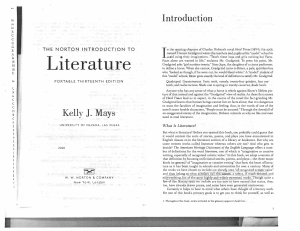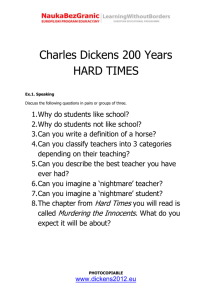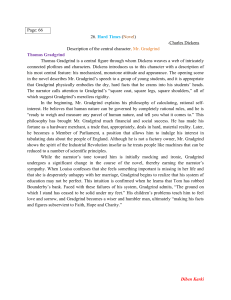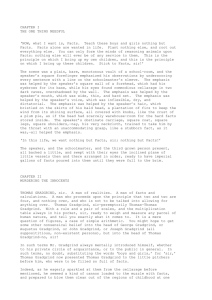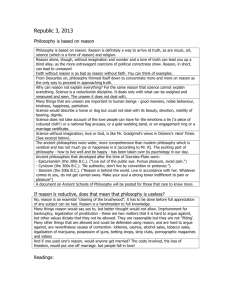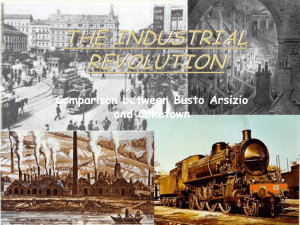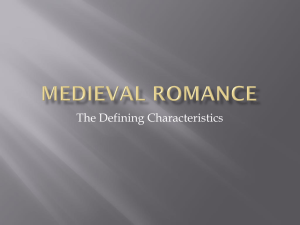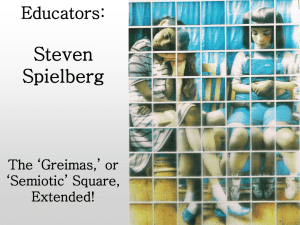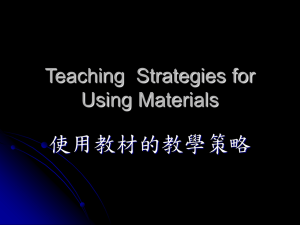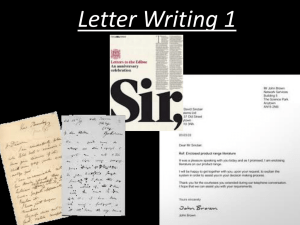HARD TIMES-chap 1-2 and ex
advertisement
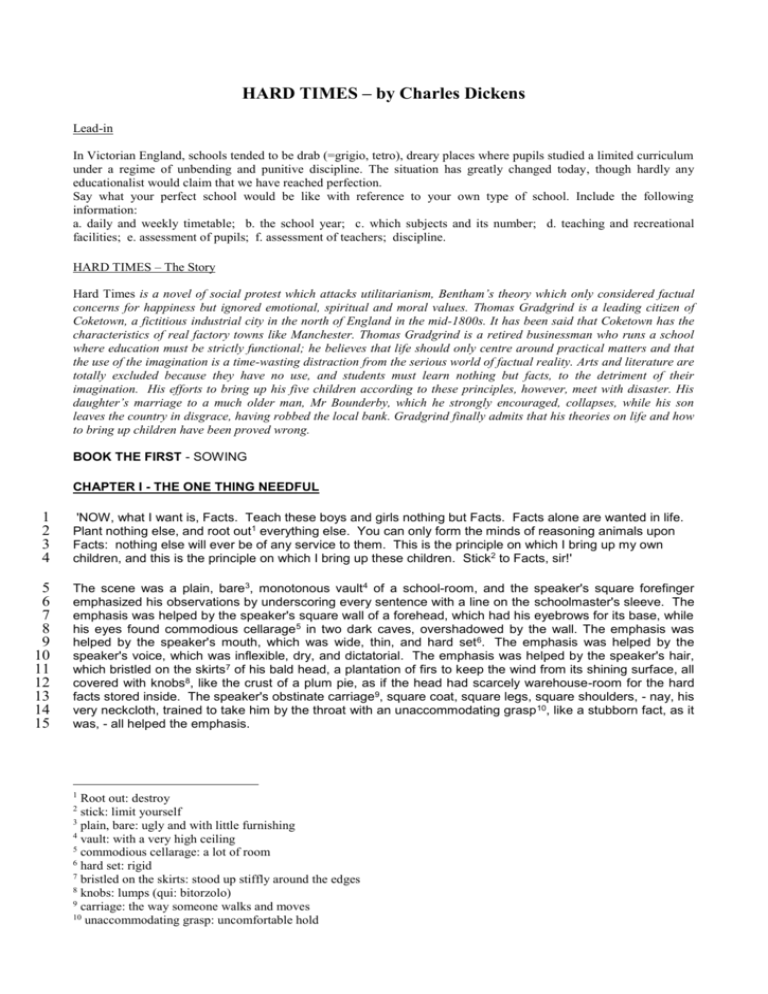
HARD TIMES – by Charles Dickens Lead-in In Victorian England, schools tended to be drab (=grigio, tetro), dreary places where pupils studied a limited curriculum under a regime of unbending and punitive discipline. The situation has greatly changed today, though hardly any educationalist would claim that we have reached perfection. Say what your perfect school would be like with reference to your own type of school. Include the following information: a. daily and weekly timetable; b. the school year; c. which subjects and its number; d. teaching and recreational facilities; e. assessment of pupils; f. assessment of teachers; discipline. HARD TIMES – The Story Hard Times is a novel of social protest which attacks utilitarianism, Bentham’s theory which only considered factual concerns for happiness but ignored emotional, spiritual and moral values. Thomas Gradgrind is a leading citizen of Coketown, a fictitious industrial city in the north of England in the mid-1800s. It has been said that Coketown has the characteristics of real factory towns like Manchester. Thomas Gradgrind is a retired businessman who runs a school where education must be strictly functional; he believes that life should only centre around practical matters and that the use of the imagination is a time-wasting distraction from the serious world of factual reality. Arts and literature are totally excluded because they have no use, and students must learn nothing but facts, to the detriment of their imagination. His efforts to bring up his five children according to these principles, however, meet with disaster. His daughter’s marriage to a much older man, Mr Bounderby, which he strongly encouraged, collapses, while his son leaves the country in disgrace, having robbed the local bank. Gradgrind finally admits that his theories on life and how to bring up children have been proved wrong. BOOK THE FIRST - SOWING CHAPTER I - THE ONE THING NEEDFUL 1 2 3 4 5 6 7 8 9 10 11 12 13 14 15 'NOW, what I want is, Facts. Teach these boys and girls nothing but Facts. Facts alone are wanted in life. Plant nothing else, and root out1 everything else. You can only form the minds of reasoning animals upon Facts: nothing else will ever be of any service to them. This is the principle on which I bring up my own children, and this is the principle on which I bring up these children. Stick2 to Facts, sir!' The scene was a plain, bare3, monotonous vault4 of a school-room, and the speaker's square forefinger emphasized his observations by underscoring every sentence with a line on the schoolmaster's sleeve. The emphasis was helped by the speaker's square wall of a forehead, which had his eyebrows for its base, while his eyes found commodious cellarage 5 in two dark caves, overshadowed by the wall. The emphasis was helped by the speaker's mouth, which was wide, thin, and hard set 6. The emphasis was helped by the speaker's voice, which was inflexible, dry, and dictatorial. The emphasis was helped by the speaker's hair, which bristled on the skirts7 of his bald head, a plantation of firs to keep the wind from its shining surface, all covered with knobs8, like the crust of a plum pie, as if the head had scarcely warehouse-room for the hard facts stored inside. The speaker's obstinate carriage9, square coat, square legs, square shoulders, - nay, his very neckcloth, trained to take him by the throat with an unaccommodating grasp 10, like a stubborn fact, as it was, - all helped the emphasis. 1 Root out: destroy stick: limit yourself 3 plain, bare: ugly and with little furnishing 4 vault: with a very high ceiling 5 commodious cellarage: a lot of room 6 hard set: rigid 7 bristled on the skirts: stood up stiffly around the edges 8 knobs: lumps (qui: bitorzolo) 9 carriage: the way someone walks and moves 10 unaccommodating grasp: uncomfortable hold 2 'In this life, we want nothing but Facts, sir; nothing but Facts!' The speaker, and the schoolmaster, and the third grown person present, all backed a little 11, and swept with their eyes the inclined plane of little vessels then and there arranged in order, ready to have imperial gallons of facts poured into them until they were full to the brim12. CHAPTER II - MURDERING THE INNOCENTS THOMAS GRADGRIND, sir. A man of realities. A man of facts and calculations. A man who proceeds upon the principle that two and two are four, and nothing over, and who is not to be talked into allowing for anything over13. Thomas Gradgrind, sir - peremptorily Thomas - Thomas Gradgrind. With a rule and a pair of scales14, and the multiplication table always in his pocket, sir, ready to weigh and measure any parcel 15 of human nature, and tell you exactly what it comes to. It is a mere question of figures, a case of simple arithmetic. You might hope to get some other nonsensical belief into the head of George Gradgrind, or Augustus Gradgrind, or John Gradgrind, or Joseph Gradgrind (all supposititious 16, non-existent persons), but into the head of Thomas Gradgrind - no, sir! In such terms Mr. Gradgrind always mentally introduced himself, whether to his private circle of acquaintance, or to the public in general. In such terms, no doubt, substituting the words 'boys and girls,' for 'sir,' Thomas Gradgrind now presented Thomas Gradgrind to the little pitchers 17 before him, who were to be filled so full of facts. Indeed, as he eagerly sparkled18 at them from the cellarage before mentioned, he seemed a kind of cannon loaded to the muzzle with facts, and prepared to blow them clean out of the regions of childhood at one discharge19. He seemed a galvanizing apparatus, too, charged with a grim mechanical substitute for the tender young imaginations that were to be stormed away. 'Girl number twenty20,' said Mr. Gradgrind, squarely pointing with his square forefinger, 'I don't know that girl. Who is that girl?' 'Sissy Jupe, sir,' explained number twenty, blushing, standing up, and curtseying 21. 'Sissy is not a name,' said Mr. Gradgrind. 'Don't call yourself Sissy. Call yourself Cecilia.' 'It's father as22 calls me Sissy, sir,' returned the young girl in a trembling voice, and with another curtsey. 'Then he has no business to do it,' said Mr. Gradgrind. 'Tell him he mustn't. Cecilia Jupe. Let me see. What is your father?' 'He belongs to the horse-riding, if you please, sir.' Mr. Gradgrind frowned, and waved off the objectionable calling with his hand 23. 11 backed a little: took a step backwards and swept…. they were full to the brim: facendo girare tutto intorno lo sguardo, scrutarono i piccoli vasi disposti qua e là, in ordine, pronti a ingollare galloni e galloni di fatti, che li avrebbero colmati fino all’orlo. 12 and who …. for anything over: che non si lascia convincere a concedere niente di più. Pair of scales: instrument used to weigh things 15 parcel: (qui) particella 16 supposititious: not real 17 pitchers: containers for liquids 18 eagerly sparked: looked brightly 19 he seemed a… childhood at one discharge: sembrava una specie di cannone che, carico di fatti fino all’imboccatura, si preparasse a scagliarli d’un sol colpo al di là delle regioni dell’infanzia. 20 In the Victorian Age classes were very large and the students were called by number, in military style, for ease of reference. 21 Curtseying: bending for respect 22 as: (qui) who 13 14 'We don't want to know anything about that, here. You mustn't tell us about that, here. Your father breaks24 horses, don't he?' 'If you please, sir, when they can get any to break, they do break horses in the ring, sir.' 'You mustn't tell us about the ring, here. Very well, then. Describe your father as a horsebreaker. He doctors25 sick horses, I dare say?' 'Oh yes, sir.' 'Very well, then. He is a veterinary surgeon, a farrier 26, and horsebreaker. Give me your definition of a horse.' (Sissy Jupe thrown into the greatest alarm by this demand.) 'Girl number twenty unable to define a horse!' said Mr. Gradgrind, for the general behoof27 of all the little pitchers. 'Girl number twenty possessed of no facts, in reference to one of the commonest of animals! Some boy's definition of a horse. Bitzer, yours.' The square finger, moving here and there, lighted suddenly on Bitzer, perhaps because he chanced to sit in the same ray of sunlight which, darting in at 28 one of the bare windows of the intensely white-washed room, irradiated Sissy. For, the boys and girls sat on the face of the inclined plane in two compact bodies, divided up the centre by a narrow interval; and Sissy, being at the corner of a row on the sunny side, came in for the beginning of a sunbeam, of which Bitzer, being at the corner of a row on the other side, a few rows in advance, caught the end. But, whereas the girl was so dark-eyed and dark-haired, that she seemed to receive a deeper and more lustrous colour from the sun, when it shone upon her, the boy was so light-eyed and light-haired that the self-same rays appeared to draw out of him 29 what little colour he ever possessed. His cold eyes would hardly have been eyes, but for the short ends of lashes which, by bringing them into immediate contrast with something paler than themselves, expressed their form. His short-cropped30 hair might have been a mere continuation of the sandy freckles on his forehead and face. His skin was so unwholesomely31 deficient in the natural tinge32, that he looked as though, if he were cut, he would bleed white. 'Bitzer,' said Thomas Gradgrind. 'Your definition of a horse.' 'Quadruped. Graminivorous. Forty teeth, namely twenty-four grinders33, four eye-teeth, and twelve incisive. Sheds coat34 in the spring; in marshy35 countries, sheds hoofs36, too. Hoofs hard, but requiring to be shod37 with iron. Age known by marks in mouth.' Thus (and much more) Bitzer. 'Now girl number twenty,' said Mr. Gradgrind. 'You know what a horse is’. waved off.. with his hand: with the movement of his hand Mr Gradgrind got rid of Sissy’s explanation about her father job. 24 Breaks: tames or trains 25 doctors: cures 26 farrier: person who makes shoes for horses’ feet 27 behoof: use, advantage 28 darting in at: coming in through 29 draw out of: take away from 30 short-cropped: cut very short 31 unwholesomely: unhealthily 32 tinge: colour 33 grinders: molari 34 sheds coat: loses hair 35 marshy: wet 36 hoofs: hard parts of horses’ feet (zoccoli) 37 to be shod: to be covered 23 Comprehension 1. Which adjectives are used to describe Mr Gradgrind’s voice? 2. What is the basic principle of his educational theories? 3. What did he wish to destroy in the minds of the boys and girls who sat before him? Analysis 1. Which expressions does Mr Gradgrind use to refer to children in the first paragraph? What does he believe distinguishes people from animals? 2. Where does the scene take place? What details of the setting reinforce Mr Gradgrind’s philosophy that education should be based solely on facts? 3. Identify the metaphor used for schoolchildren in the last lines of the first chapter (16-20). What idea of education is conveyed by imperial gallon (l. 18), poured into them until they were full to the brim (l. 20) and little pitchers as extended metaphor?
